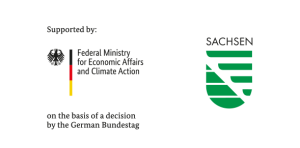Country Overshoot Day marks the date each year when a country would have exhausted its annual biocapacity budget — if everyone in the world lived like its population. In Germany, that date in 2025 falls as early as 5 May — more than three months earlier than in the previous year. At Leipzig University’s b-ACTmatter research and transfer centre, innovative approaches are being explored to address the growing scarcity of resources in the face of a rising global population — through sustainable production processes and circular economy technologies. The REPLACER project is developing new generations of hybrid living materials. These materials are designed to reduce plastic pollution by using CO₂ and methane, says project lead Dr Rohan Karande in an interview.
Category: News
Bioactive matter – technologies for sustainable production and a healthy environment of the future
We are currently facing major social challenges. Topics such as resource scarcity, the climate crisis and social and economic injustice are issues of acute relevance. On 24 March 2025, the university research and transfer centre b-ACTmatter held a symposium on these key issues. The centre’s interdisciplinary and broad-based scientific team cooperates with regional and international partners to develop innovative solutions and successfully establish them on the market.
In the presence of representatives from the Saxon State Ministries for Infrastructure and Regional Development (SMIL) and for Science, Culture and Tourism (SMWK), the Research and Transfer Centre for Bioactive Matter at Leipzig University (b-ACTmatter) held a one-day symposium on 24 March 2025, which focused on new approaches to solving pressing social challenges such as resource scarcity, sustainable production processes and comprehensive environmental protection and monitoring. Together with representatives from science, industry and administration, the participants discussed how interdisciplinary research in the field of bioactive matter – with properties of living and biological organisms – can help to overcome these challenges and rapidly transfer innovative solutions into industrial applications. On the one hand, the symposium offered a review of the past three years in which the centre was established as part of the ‘aufbauACT’ project, which is part of the STARK programme for structural support in lignite mining regions. On the other hand, it looked to the future in order to define the next steps and goals.
The diverse portfolio of b-ACTmatter was discussed with academic and industrial partners from Saxony, Germany and across Europe. Topics ranged from the AI-supported development of bioactive substances and technologies for converting CO₂ and waste streams into sustainable chemical products and energy sources to innovative meat alternatives. A particular focus was placed on the rapid and efficient transfer of the latest research findings into technological applications and industrial processes. Both existing obstacles to technology transfer and new regional opportunities in the Leipzig area, which arise in particular as a result of funding under the STARK programme for structural change in the lignite regions, were discussed in detail.
Successful examples were presented by promising start-ups and spin-off initiatives such as Pacifico Biolabs, EST3R Biotech and SCPsense. They emphasised how crucial the support of partners in the entrepreneurial, scientific and technological fields – including Leipzig University’s SMILE start-up initiative, b-ACTmatter and the leap:up and medical:forge associations – is in successfully overcoming critical hurdles in the spin-off process.
Looking back, the symposium showed that b-ACTmatter has successfully established itself in the region since its launch in July 2021 and has also built up a strong national and international network. During this time, the centre has been able to achieve new research results in more than 20 projects together with over 20 partners from science and industry. At the same time, b-ACTmatter actively supports innovative spin-off projects such as Pacifico Biolabs, EST3R Biotech and SCPsense. The current research projects REPLACER, BIOWIN, LivMat and Microbial Leaf utilise pioneering concepts of hybrid living materials to produce biobased and sustainably produced precursors for plastics, animal feed and pharmaceuticals from CO₂ and/or waste streams.
What’s next? In strategic cooperation with other regional centres and institutes, b-ACTmatter is developing new perspectives for research and transfer in the field of bioactive matter: the centre will intensify its cooperation with the Center for the Transformation of Chemistry (CTC), which is currently being established, and the Kurt Schwabe Institute for Measurement and Sensor Technology Meinsberg e.V.. In addition, b-ACTmatter is planning to establish a venture lab together with the BBZ at Leipzig University as part of its reorganisation in order to transfer innovations into commercial applications in an even more targeted manner.
Looking to the first years of b-ACTmatter, the speakers at the symposium were also positive about the development of the centre: the Vice-Rector for Excellence Development: Research and Transfer, Prof. Dr Jens-Karl Eilers, and the representatives of the Saxon State Ministries – Dr Konstantin Pötschke from the Ministry of Infrastructure and Regional Development (SMIL) and Dr Lutz Bryja from the Ministry of Science, Culture and Tourism (SMWK). Dr Konstantin Pötschke, head of the department for supra-regional structural development measures, aptly emphasised that the first period of the centre was a ‘AUFBAU-ACT’, an act of construction. The solid foundations have now been laid, creating excellent conditions for further growth and innovation.
With this strong foundation and its interdisciplinary network, b-ACTmatter is ideally positioned to develop pioneering solutions for global challenges in the coming years and to establish the Leipzig region internationally as a centre of innovation for bioactive technologies.
The future of the sustainable bioeconomy has already begun here.
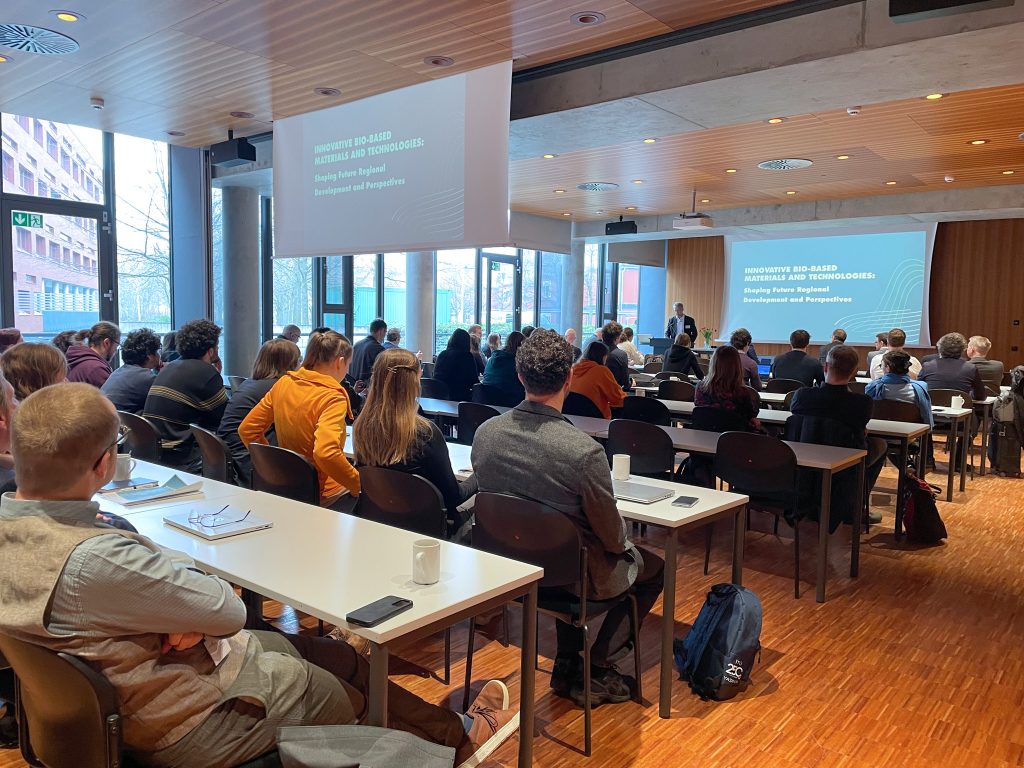
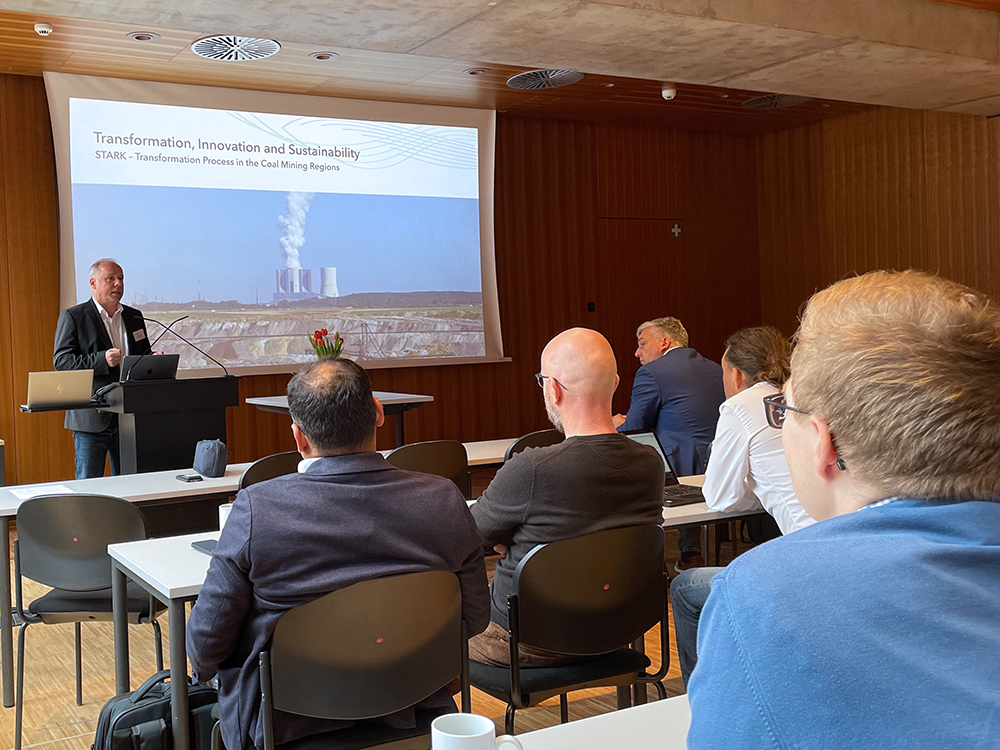
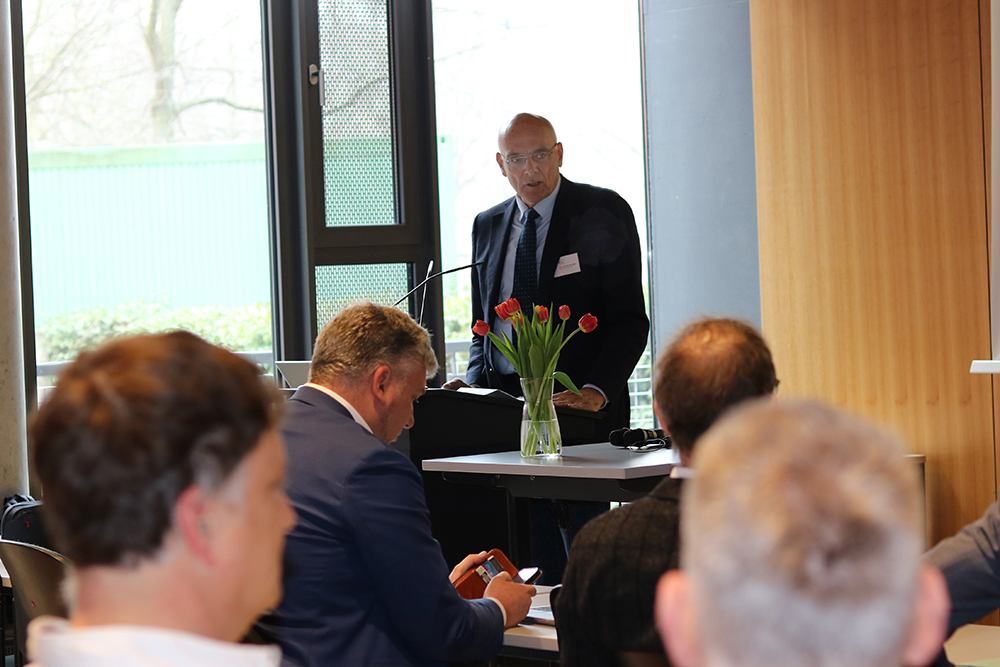


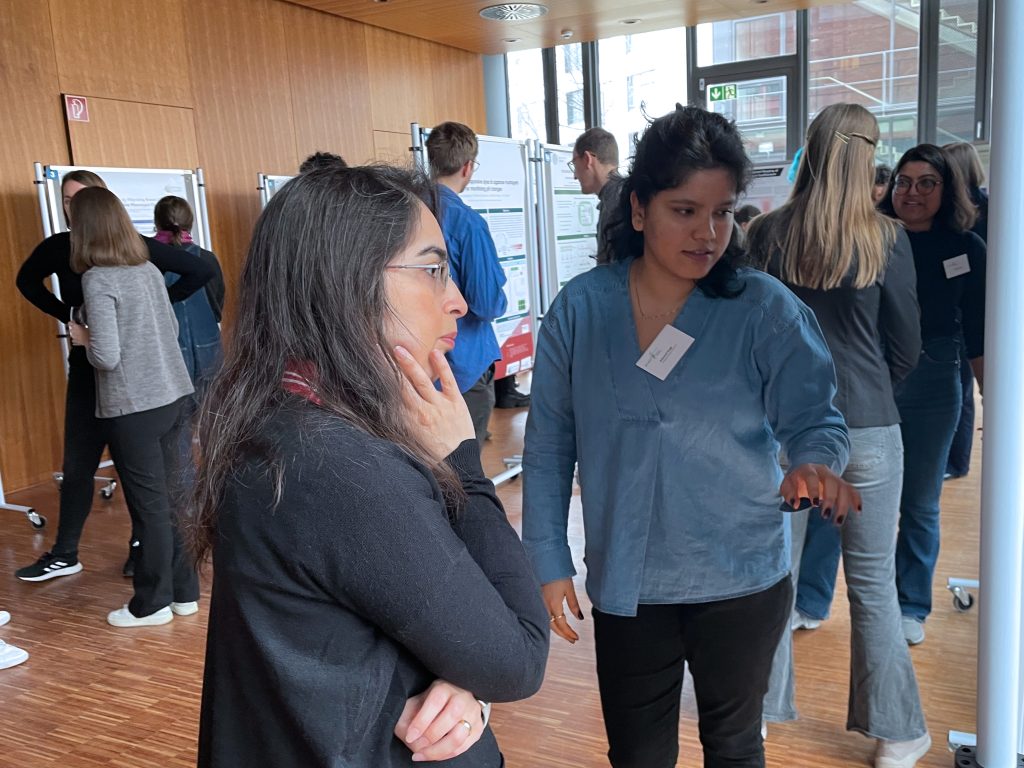
Impressions of the Symposium. Photos: University of Lepzig, b-ACTmatter
Science communication: Research presented in an entertaining way
Bringing science to the public and communicating research content and arguments in an appealing way is an important qualification for scientists.
Selina Hanisch, a doctoral student in the BioMat working group at b-ACTmatter, presented her research work to the public in an entertaining way at two events in autumn.
At the ‘Salon of Science’ on 6 November 2024 at the Chemnitz Industrial Museum, visitors received answers from researchers from various scientific fields to questions such as ‘When will we wear clothes made of CO2?’, ‘When will we travel completely emission-free?’ or ‘How can we achieve the energy transition?’. The event format focuses on personal dialogue.
Together with other experts from Aachen, Dresden, Freiberg and Ilmenau, Selina answered the questions of science-interested guests from the surrounding area in an ‘Ask the Scientist’ interview format. Parallel to the event, the travelling exhibition ‘Power2Change: Mission Energiewende’ was also open to visitors.
Every year, Leipzig University also offers scientists a platform where graduates can present their research work in a generally understandable and entertaining way. On 12 November 2024, the Graduate Academy Leipzig hosted a science slam to mark ‘Doctorate Day’. Here you could present your own research in 10 minutes in an entertaining way. Jack Pop, known from the Circus of Science, led through the evening with interactive experiments.
Selina took 2nd place in the Science Slam that evening with her presentation entitled ‘Bacterial co-housing: from survival to synergy’. Congratulations to her!

Selina Hanisch (left) at the Salon of Science in the Chemnitz Industrial Museum. Photo: Marcel Frank
New managing director at the b-ACT matter research and transfer centre
In November 2024, Franziska Ullm took over as Managing Director of the Research and Transfer Centre for Bioactive Matter b-ACT matter, succeeding Dr Susanne Ebitsch, who left Leipzig University in October to join the Center for the Transformation of Chemistry (CTC).
The biochemist from Saxony is not new to Leipzig University. She has already studied biology here and later completed a master’s degree in biochemistry with a specialisation in biomedicine.
After completing her studies, Franziska Ullm remained at Leipzig University for the time being: She worked at the Institute of Biochemistry as a research assistant and doctoral student until 2022, where she gained experience in coordinating research projects and supervising junior researchers.
For the past two years, she worked at the FILK Freiberg Institute gGmbH, a non-university Freiberg research institution with an accredited testing laboratory specialising in materials science and technology development.
We are delighted that Franziska Ullm has taken over the administrative management of the centre and would like to extend a warm welcome to her!

What is the circular economy?
SAS and b-ACTmatter visit pupils in Lommatzsch
On August 6 and 7, Dr. Susanne Ebitsch, Managing Director of b-ACTmatter, and Thomas Wendland from the Saxon Agency for Structural Development GmbH SAS, visited the Lommatzscher secondary school for Nursing care for a talk on Circular Economy.
The aim was to familiarize the 8th and 9th grade students with the topic using the traveling exhibition “Circular economy from the perspective of Saxon research institutions” and the projects about enzymatic plastic recycling by the founding team ESTER Biotech and plastic production with slimy bacteria / algae-WGs by the junior research group BIOMAT of b-ACT matter. Together with the pupils, we discussed ideas on how everyone can contribute to a sustainable circular economy. The drinking cups and gardening tools made from bio-based plastic (PBS @ Exipnos) were particularly eye-catching. The circular economy has particularly great potential for successful structural development in the Free State of Saxony.
The aim was therefore also to sensitize the young generation to the importance of the circular economy and to provide initial insights into research and the future world of work.
Many thanks to the principal Ms. Gerlach and all the class teachers involved!

b-ACT matter Retreat at Nimbschen
Away from their desks and out of the lab: the b-ACT matter team spent a day at the Nimbschen Monastery Hotel near Grimma to review the current status of research and transfer projects at b-ACT Matter.
Dr. Henri Franquelim and Dr. Rohan Karande presented the innovative research of their junior research groups on the development of biomimetic systems and biomaterials. The LivMat and REPLACER projects, for example, offer opportunities to transform the chemical industry with new bacterial technologies.
In the transfer sector, Prof. Tilo Pompe presented his research group’s start-up project, in which point-of-use sensor assays are developed and used as mobile detection methods for chemical compounds in environmental samples. Dr. Christian Sonnendecker from the start-up EST3R Biotech presented the latest optimizations in the design of plastic-degrading enzymes on the way to high-throughput processes for industrial use.
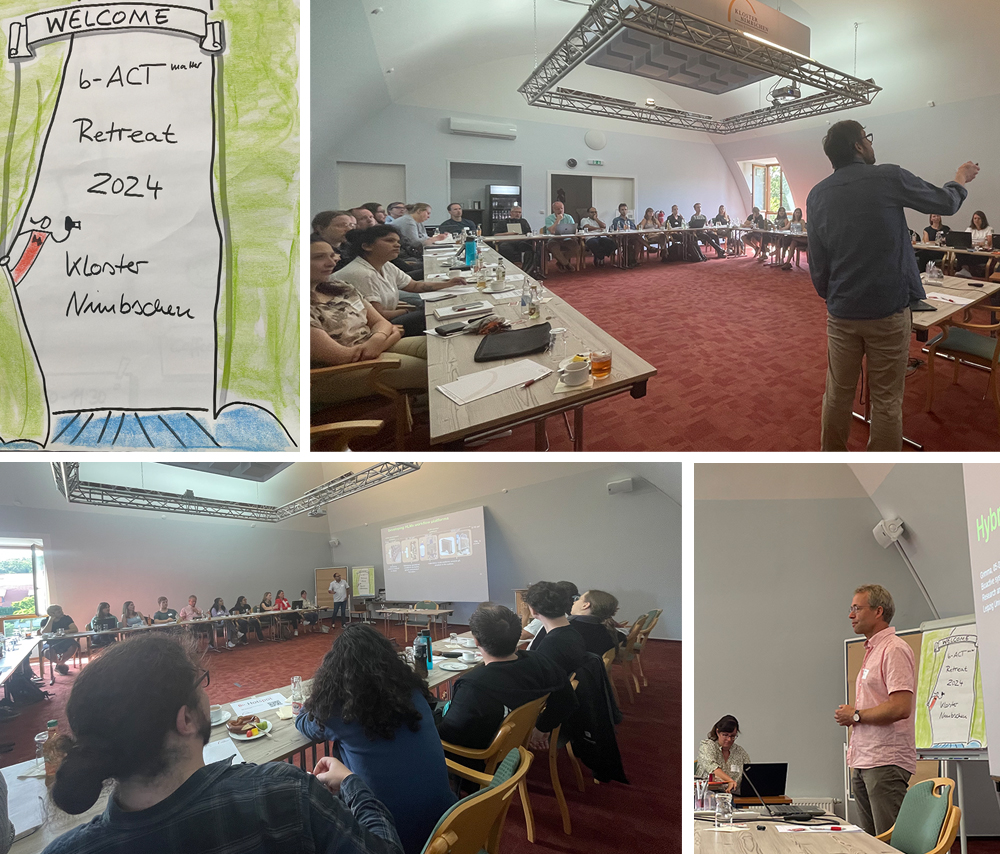
LivMat project has started
We recently started our new M-ERA.NET Pproject “LivMat: Productive catalytic living materials: combining 3D biobased fibrillar membranes with synthetic microbial consortia to produce chemicals” together with our partners from Helmholtz Centre for Environmental Research (UFZ), Solaga GmbH, Istanbul Technical University, Kaunas University of Technology and University of Latvia.
The LivMat project aims to syndicate biobased porous materials with microbial consortia to effectively capture natural and waste resources to synthesize chemicals continuously, demonstrating the basis for catalytic living materials. Within the project we will exemplify the approach by the production of monomers for textile polymer synthesis including ε-caprolactone and adipic acid.
b-ACT matter at the Saxon Innovation Conference 2024
We at b-ACTmatter had a lot of fun and great discussions at the Saxon Innovation Conference 2024 on 19 June 2024!
In the workshop “From research to product – how does it work?” we got suggestions on how to use design thinking to further develop our research results in an application-oriented and user-centered way. We got creative (see picture Rohan Karande ). Thanks to Jannis Bulla , Milina Rochelle Alber and Lydia Woiterski.
Ronny Frank reports on the ESTER Biotech team’s validation grant results at the conference.
Congratulations to the winners of the Saxon Founder Award
- 1st place: enaDyne
- 2nd place: next3D
- 3rd place: Primogene
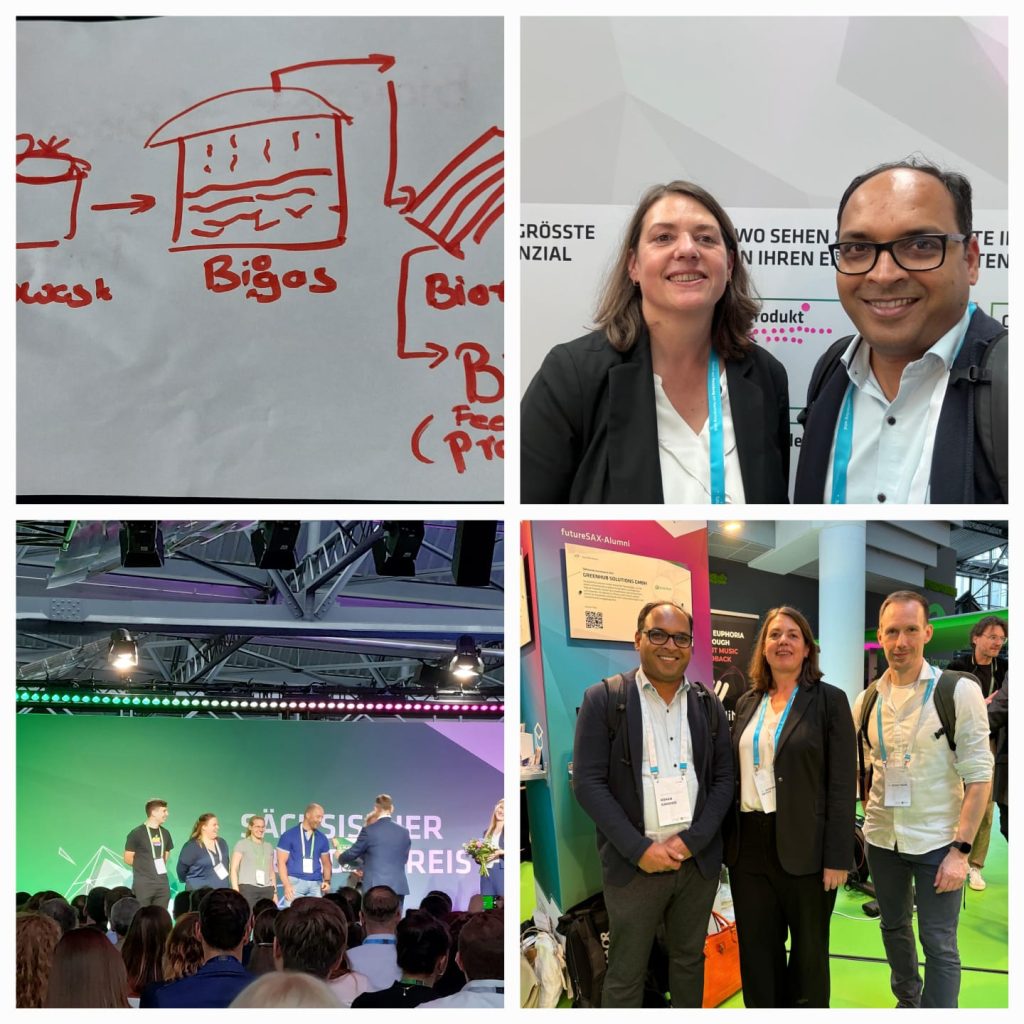
Science communication at its best
Vocatium is a career fair for pupils and students and took place in Dresden on May 28, 2024. The fair is a platform for training and studying that offers career guidance for pupils and parents every year.
In addition to the opportunity to talk to trainers on site, pupils and students can also gain insights into the various professional fields through presentations by exhibitors.
Selina Hanisch explained “How a slimy bacterial flat share is helping to shape our energy transition” in a Science Slam at the Vocatium and won 2nd place!
Congratulations!

b-ACT matter in television
On May 14, 2024, a report for the ARD program was filmed at b-ACTmatter and the Faculty of Chemistry. The report was broadcast this Monday on ARD Mittagsmagazin.
In the programme, Dr. Christian Sonnendecker and Dr. Ronny Frank from the start-up team ESTER Biotech explain how they are planning the up-scaling of PET recycling with enzymes from laboratory scale to industrial application. The result is PET monomers that can be reused for production without fossil fuels.

Millions of tons of plastic waste are generated in Germany every year. Only 35 percent of the plastic waste collected is recycled and less than one percent is returned to raw materials or chemicals. The majority of plastic waste is used to generate energy, i.e. incinerated. During the incineration process, the climate-damaging carbon dioxide is released into the atmosphere as exhaust gas.
Two years ago, Dr. Christian Sonnendecker from the Institute of Analytical Chemistry and the b-ACTmatter transfer center at Leipzig’s Südfriedhof cemetery discovered an enzyme that can be used to break down polyethylene terephthalate, or PET for short, into its basic chemical components in record time and process it for the manufacture of new PET products. The process enables 100% and infinitely repeatable recycling, which could replace previous processes that only allow a few PET reuse cycles and enable efficient recycling. Since then, the enzyme has been continuously developed and optimized with the support of scientists from the Chair of Structural Analysis and the Chair of Biochemical Cell Technology at the BBZ.
In the article, Dr. Sonnendecker presents a prototype recycling technology in the laboratories of the BBZ and b-ACTmatter that makes it possible to break down PET products into their individual components twice as quickly as two years ago.
Together with Dr. Ronny Frank from the Chair of Biochemical Cell Technology at the BBZ, the biochemist is now working on a reactor that is 50 times larger and can decompose up to 20 kilograms of PET in twelve hours. In order to utilize the process industrially, the two scientists would like to transfer the technology into a start-up with the spin-off project ESTER Biotech.
